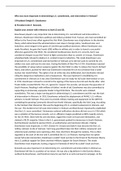Who was more important in determining U.S. commitment, and intervention in Vietnam?
i) President Dwight D. Eisenhower
ii) President John F. Kennedy
Explain your answer with reference to both (i) and (ii).
Eisenhower played a very important role in determining U.S. commitment and intervention in
Vietnam. Eisenhower inherited a political and military problem from Truman, who had committed $2
billion to the French war effort against the Viet Minh. Eisenhower was a big believer in the domino
theory which determined the administrations next steps in foreign policy. Southeast Asia, and
Indochina, were integral in the game of Cold War geo-political dominoes. When Eisenhower was
made President, he gave the French $385 million in military aid, in order to launch a successful
offensive against the Viet Minh. He considered Southeast Asia vital to U.S. security, but it was
considered cheaper to pay the French to fight communism than to commit U.S troops. Eisenhower
wholeheartedly refused to deploy U.S. combat troops to Indochina. This made Eisenhower very
important in U.S. commitment and intervention in Vietnam as he did not want to commit his U.S.
soldiers too soon and lose his own men. During the Battle of Dien Phu in 1954, Eisenhower rejected
the possibility of using nuclear weapons against the Viet Minh in order to relieve the French. Richard
Nixon, and others, pushed for them but Eisenhower remained firm in his conviction that a wider
nuclear war would follow. The option of an air strike was also deliberated, but Eisenhower refused
citing the dangerous implications and consequences. This was important in establishing U.S.
commitment in Vietnam as it was clear Eisenhower was not ready for full scale intervention or war.
In 1954, Eisenhower refused to commit to the signing of the Geneva Accords and shortly after, John
Foster Dulles created SEATO. The U.S. agreed to ‘respect’ the accords, yet became the guarantor of
South Vietnam, flooding it with millions of dollars’ worth of aid. Eisenhower was also committed to
supporting an immensely unpopular leader in Ngo Dinh Diem. The Accords were violated,
nonetheless. This was a major turning point in determining U.S. commitment and this was the start
of intervention in Vietnam. In 1955, Eisenhower ordered the deployment of MAAG, U.S. military
advisers, to South Vietnam. They were to provide military training and equipment to the ARVN in
combating the growing Communist threat from North Vietnam, specifically the Viet Cong. According
to the Vietnam War Memorial, this was the beginning of U.S. combat involvement in Vietnam, and
the war. This bordered on full-scale intervention in Vietnam and Eisenhower importantly established
that the U.S. were committed. Vietnamese national unification elections did not occur in 1956 which
was a violation of the Geneva accords, as U.S. officials in Saigon predicted an 80% majority victory
for Ho Chi Minh. Diem held his own elections, rigged the result via fraud and intimidation, and
claimed a 98.2% majority. Many in the U.S. government pushed for democracy in South Vietnam,
but Eisenhower pushed to sponsor Diem: an authoritarian and repressive dictator. Making
Eisenhower most important, in 1959, Chester M. Ovnand and Dale R. Buis become the first U.S.
military advisers to die in Vietnam. Viet Cong guerrillas broke into their military compound, and
whilst Ovnand and Buis were watching a film, they shot them through the window. This is often
regarded as the start of the war and it committed the U.S. to Vietnam, leaving them no option
except full-scale intervention. Eisenhower couldn’t back out due to the threat of the Domino theory,
the U.S. political support for Diem and their Military Support for South Vietnam. This made
Eisenhower most important, leaving a legacy for Kennedy of which he couldn’t back out from.
Kennedy was also important in in determining U.S. commitment and intervention in Vietnam as
Eisenhower left him in a position of no-return. He was also a big believer in the Domino theory,
outlined by Eisenhower, and therefore knew he was tied to an anti-communist campaign. As the





